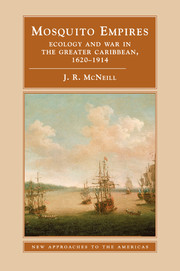Book contents
- Frontmatter
- Contents
- List of Maps
- List of Abbreviations Used in the Footnotes
- Preface
- Acknowledgments
- 1 The Argument (and Its Limits) in Brief
- PART I SETTING THE SCENE
- PART II IMPERIAL MOSQUITOES
- 4 Fevers Take Hold: From Recife to Kourou
- 5 Yellow Fever Rampant and British Ambition Repulsed, 1690–1780
- PART III REVOLUTIONARY MOSQUITOES
- Bibliography
- Index
- References
5 - Yellow Fever Rampant and British Ambition Repulsed, 1690–1780
Published online by Cambridge University Press: 05 June 2012
- Frontmatter
- Contents
- List of Maps
- List of Abbreviations Used in the Footnotes
- Preface
- Acknowledgments
- 1 The Argument (and Its Limits) in Brief
- PART I SETTING THE SCENE
- PART II IMPERIAL MOSQUITOES
- 4 Fevers Take Hold: From Recife to Kourou
- 5 Yellow Fever Rampant and British Ambition Repulsed, 1690–1780
- PART III REVOLUTIONARY MOSQUITOES
- Bibliography
- Index
- References
Summary
If my soldiers began to think, not one would remain in the ranks.
– Frederick the GreatFrom the 1690s, yellow fever again and again hampered military operations as well as settlement schemes in the West Indies. Malaria did too, but much less so. The largest armed expeditions were those mounted by Britain in attempts on Cartagena in 1741 and Havana in 1762. The siege of Cartagena involved the largest amphibious operation in history until the 1790s, and represented a genuine attempt to seize the trade, production, and territory of Spanish America. Had it not been for yellow fever, Britain almost surely would have prevailed at Cartagena, and pursued the dream Cromwell conceived a century before. At Havana yellow fever destroyed an army, converting a British conquest into a pyrrhic victory and a dead end.
YELLOW FEVER AND THE DEFENSE OF THE SPANISH EMPIRE
In the first century of its American empire, the Spanish Crown had avoided heavy investment in imperial defense, relying on distance and the logistical difficulties its enemies would face. By and large, this was enough. Sea rovers and buccaneers like Francis Drake or John Hawkins might intercept a few ships now and again, might sweep down on a poorly defended settlement and sack it. But Spain's enemies did not have the resources to take and hold anything of consequence.
- Type
- Chapter
- Information
- Mosquito EmpiresEcology and War in the Greater Caribbean, 1620–1914, pp. 137 - 192Publisher: Cambridge University PressPrint publication year: 2010

